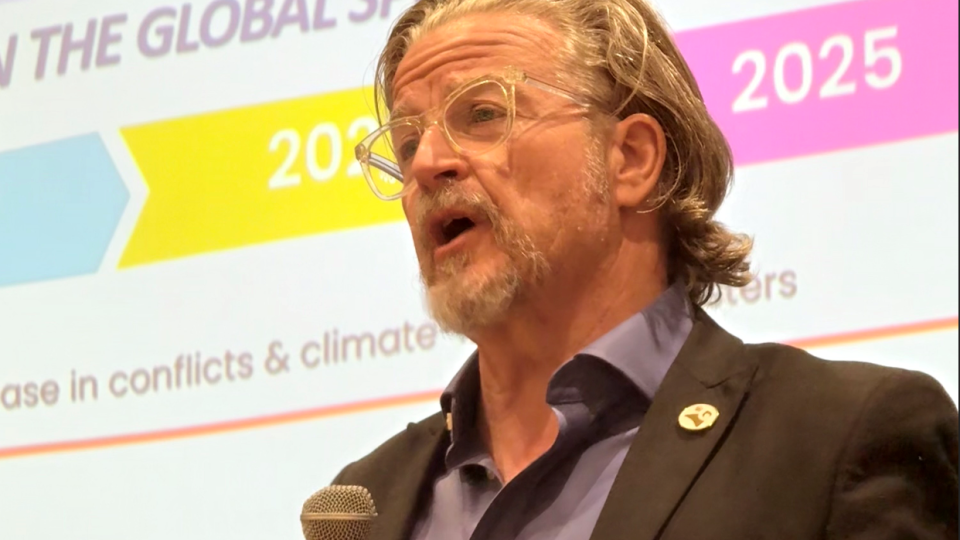The power of nursing can defend against global health and infectious disease crises, says ICN CEO

ICN's CEO Howard Catton opened yesterday’s 7th International Global Network of Public Health Nursing (GNPHN) Conference in Calgary, Canada with a clear message: nurses must harness their power to address the world’s biggest health challenges — and they must be enabled with investment and policy that supports a strong, sustainable health workforce.
Mr Catton was also quoted in leading Canadian news site CBC, where he discussed the essential role of nurses in promoting vaccination to combat declining immunization rates and rising infectious diseases, currently a severe health issue globally. The Canadian province of Alberta, where Calgary is located, is currently experiencing its worst year of measles since 1970, and Mr Catton highlighted the importance of nurse leadership in vaccination efforts to curb the resurgence of infectious disease around the world. ICN supports the World Federation of Public Health Associations (WFPHA) initiatives and recent call to action for life-course vaccination.
Mr Catton told CBC: “Vaccination is the best public health buy there is. In terms of bang for buck, the cost is miniscule in terms of the return in good health. Nurses play a critical role in promoting immunization and advising their communities. Nurses are consistently the most trusted profession in surveys that are done right the way around the world — and that trust brings the power to heal and to improve public health.”
In his keynote speech at the GHPHN conference, co-hosted by the University of Calgary's Faculty of Nursing and Mount Royal University's School of Nursing and Midwifery, Mr Catton emphasized the power of nursing to counter threats to global health, saying:
“Alice Walker once observed that the most common way people give up power is by thinking they don't have any. She could have been speaking directly about nurses. The theme of today’s conference is Innovations in Public Health Nursing: Building a Healthier Future, and I want to remind every nurse that you have the power to shape that future — but only if you recognize it, embrace it, and advocate for it.
‘We are facing grave threats to global health and the world needs nurses to step fully into their power more than ever before. We need leaders and policies to urgently support them in doing so by providing safe, decent working conditions and empowering nurses as leaders in public health.
‘This is a challenging moment marked by political uncertainty, deep cuts to health care and global aid, and a chronic failure to invest in a strong and sustainable health care workforce — at a time when our world needs to prioritize health more than ever. With less than five years left to achieve Universal Health Coverage (UHC) and the Sustainable Development Goals (SDGs), we are far off track: billions of people do not have access to care, and 100 million people have been left in extreme poverty due to medical expenses. Health needs are becoming more complex, rates of chronic diseases are rising, the global population is aging, mental health challenges are increasing, and vaccination rates are lower than they have been since before the COVID-19 pandemic. At the same time, conflicts, climate change, and natural disasters are driving joint health and humanitarian crises.
‘The principles of public health remind us that all of these factors are interconnected — and that we must address all of them to keep people safe and healthy. Nurses are the world’s largest health profession, the first and often only health workers most people see, and nurses have the power to connect the dots, to understand and address these challenges at the level of individuals, patients, and entire populations. In short, nurses have the power to heal the world — but with a 5.8 million nursing shortage, we need decisive action to invest in, protect, and build the sustainable workforce the world needs.”
Mr Catton’s speech presented clear evidence of nurses making entire populations healthier through primary and preventive health care, with examples of nurse-led initiatives transforming communities’ health and wellbeing. As well as vaccination efforts, these included case studies of nurses tackling social causes of health problems to improve the wellbeing of homeless populations, shaping policies that have demonstrably improved tobacco control, strengthening mental health services and access, and leading emergency response.
Mr Catton concluded:
“Nurses have the power to change our world because we go beyond individual patient care to address the root causes of ill health. Nurses are trusted, we are skilled, we are leaders, and we are deeply morally and ethically committed to improving public health. We must now call on leaders to value nurses’ lifesaving, world-changing work so that we can use our power to shape healthier futures for all people, everywhere.”